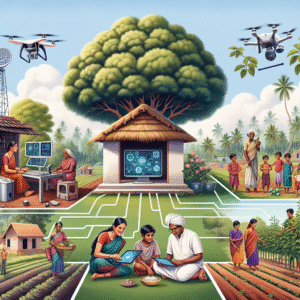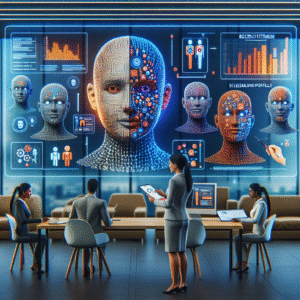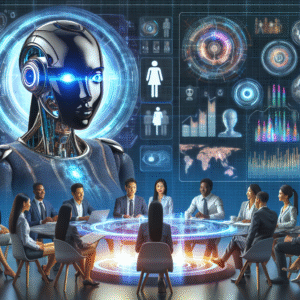AI Tools vs. Human Intelligence: Bridging the Gap in Recruitment Strategies
Estimated reading time: 6 minutes
- Understand the strengths and limitations of both AI tools and human intelligence in recruitment.
- Embrace collaboration between AI and human input for better hiring outcomes.
- Focus on candidate engagement with personalized communication.
- Address biases in AI processes to ensure equitable hiring.
- Continuously adapt recruitment strategies based on data and feedback.
Table of Contents
- Understanding AI and Human Intelligence: Key Differences
- Collaboration: Harnessing Human-AI Synergy
- Practical Takeaways for HR Professionals
- Conclusion
- FAQ
Understanding AI and Human Intelligence: Key Differences
In today’s rapidly evolving recruitment landscape, the debate surrounding AI tools vs. human intelligence has become increasingly prominent. As technology advances, organizations are exploring the ways in which artificial intelligence can enhance their human resources strategies and streamline complex processes. But what truly separates AI from human intelligence, and how can both be leveraged to create a more effective recruitment strategy?
Empathy and Social Intelligence
Human intelligence shines in areas requiring empathy, intuition, judgment, imagination, and the subtleties of communication. Our evolution as a social species has equipped us with these capabilities, making it challenging for AI to replicate such nuanced emotional responses and interpersonal skills [^1^]. For instance, when evaluating candidates, HR professionals must consider not just qualifications, but also a candidate’s cultural fit within the organization—something AI may struggle with.
Pattern Recognition and Scale
In contrast, AI excels in tasks involving pattern recognition and handling vast amounts of information with remarkable speed. Algorithms can process data and uncover insights in areas such as medical imaging, fraud detection, and even candidate assessments far quicker than a human can, reflecting a sophisticated ability to identify trends within large datasets [^2^]. This means AI can significantly enhance functions such as resume screening and matching candidates based on complex criteria.
Endurance and Objectivity
AI systems do not tire or lose focus, allowing them to efficiently manage repetitive or high-volume tasks. Created for data-driven decision-making, AI can maintain logical consistency, although it’s limited by the biases inherent in its training data [^2^]. For organizations with high recruitment volume, integrating AI tools can help in handling application backlogs without sacrificing speed.
Creativity and Abstract Thinking
Human creativity remains unparalleled. While AI can generate content by synthesizing existing data, true originality is a human trait that allows for innovative solutions and artistic expression [^1^]. In recruitment, this ability is crucial. For example, creating compelling job descriptions or engaging branding strategies often benefits from human creativity and intuition.
Learning and Adaptation
The methods by which AI and humans learn differ greatly. Human intelligence incorporates learning through experience and education, enabling individuals to adapt to unfamiliar circumstances creatively [^3^]. Conversely, AI learns through algorithms and can only operate within the scope of its training data. This disparity impacts recruitment processes as humans can make complex judgments in uncertain situations, while AI’s adaptive capacity can lag in wholly new contexts.
Problem Solving and Planning
AI technologies excel in structured problem-solving scenarios where rules are well-defined. For instance, in a rigorous assessment of job applications, AI can optimize solutions or process vast amounts of comparative data efficiently [^3^]. However, humans are better equipped to handle ambiguity, adapting plans amid uncertainty, and employing insights derived from real-time emotional and social cues—elements that are often crucial in hiring decisions.
Decision-Making
AI’s decision-making capability is based on rigorous data analysis, ensuring consistency in tasks governed by objective criteria [^3^]. In hiring, however, decisions frequently require consideration of context, emotional cues, and societal values—areas where human judgment is essential.
Energy Consumption and Efficiency
AI algorithms can execute data-processing tasks with greater energy efficiency than a human, especially for repetitive analyses [^4^]. However, humans operate on a lower energy consumption for cognitive reasoning, making them preferable for nuanced decision-making that benefits from experiential learning rather than raw data processing.
Collaboration: Harnessing Human-AI Synergy
Both AI tools and human intelligence hold unique advantages, but their integration often yields the most significant benefits for recruiting functions. Research has shown that collaboration between AI and human input leads to better outcomes than either working independently. In scenarios such as image classification or demand forecasting, the combination of human judgment and AI computation results in enhanced accuracy [^5^].
Augmentation occurs when their combined performance surpasses the average output of each working separately. The synergy achieved through effective collaboration not only enhances productivity but also fosters a richer recruitment experience for both HR professionals and candidates.
Practical Takeaways for HR Professionals
As the recruitment industry evolves, leveraging the strengths of both AI and human intelligence can lead to more effective hiring practices. Here are some actionable strategies:
- Embrace AI for Efficiency: Use AI-driven screening tools to handle the initial phases of the recruitment process, such as screening resumes and scheduling interviews. This will free up HR professionals’ time for more complex, human-centric tasks such as relationship building.
- Foster Collaborative Decision-Making: Encourage a team-based approach where AI tools provide analytical insights and human evaluators contribute context, intuition, and empathy. This combination can lead to better decision-making and enhanced candidate experiences.
- Focus on Candidate Engagement: While AI can automate communication, human touchpoints should remain critical in the recruitment process. Maintaining personalized engagement during key phases—such as interviews or feedback—will enhance candidate experience.
- Continuous Learning and Adaptation: As data processing improves through AI, ensure that your recruitment strategies evolve accordingly. Regularly evaluate the effectiveness of AI tools and adjust your processes based on the outcomes and feedback from candidates.
- Address Biases: Be proactive in recognizing and mitigating biases in AI processes. Continuous training and evaluation of AI algorithms can help ensure equitable hiring practices, fostering an inclusive work environment.
Conclusion
The discourse on AI tools vs. human intelligence is more than just a comparison—it’s about understanding how these distinct assets can be brought together in synergistic harmony. While both AI and human intelligence hold unique strengths, their combination often produces superior outcomes in recruitment processes.
By embracing the advantages of AI while harnessing the nuanced capabilities of human intelligence, organizations can refine their hiring strategies and enhance overall effectiveness. As a leading Canadian AI consulting firm, we specialize in integrating AI solutions, such as n8n workflows, to automate and optimize recruitment processes.
Are you ready to revolutionize your recruitment strategy? Contact us today to learn how we can help you implement AI tools that complement your human resources efforts for a more effective, efficient, and empathetic hiring process!
For more insights into how AI can streamline your operations and transform your HR practices, explore our services on AI Solutions and Workflow Automation.
FAQ
Q: How can AI tools benefit the recruitment process?
AI tools can automate repetitive tasks such as resume screening and interview scheduling, allowing HR professionals to focus on more strategic activities.
Q: What is the role of human intelligence in recruitment?
Human intelligence is essential for understanding cultural fit, providing empathy in interactions, and making nuanced decisions that AI may not manage well.
Q: How do we mitigate biases in AI recruitment tools?
Regularly evaluating and training AI systems on diverse datasets can help identify and reduce biases, ensuring a fair recruitment process.
Q: Can AI fully replace human recruiters?
No, while AI can enhance efficiency, human recruiters bring essential interpersonal skills and emotional intelligence that are crucial in hiring decisions.
Q: How should organizations implement AI in their hiring strategies?
Organizations should supplement AI tools with human oversight to ensure balanced decision-making that combines data insights with personal judgment.



